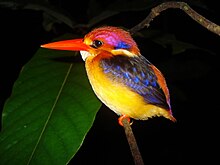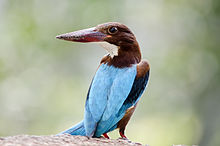Kasaykasay: Pagkakaiba sa mga binago
Inilikha sa pagsalin ng pahinang "Kingfisher" |
Inilikha sa pagsalin ng pahinang "Kingfisher" |
||
| Linya 3: | Linya 3: | ||
[[Talaksan:White-throated_kingfisher_BNC.jpg|thumb|White-throated kingfisher sa India]] |
[[Talaksan:White-throated_kingfisher_BNC.jpg|thumb|White-throated kingfisher sa India]] |
||
[[Talaksan:Kingfisher_@_madya_pradesh.JPG|thumb|Kingfisher sa Madhya pradesh]] |
[[Talaksan:Kingfisher_@_madya_pradesh.JPG|thumb|Kingfisher sa Madhya pradesh]] |
||
'''Ang Kasaykasay''' ay pangkat ng mga maliliit hanggang katamtamang laking mga makukulay na ibon sa order na Coraciiformes. |
'''Ang Kasaykasay''' ay pangkat ng mga maliliit hanggang katamtamang laking mga makukulay na ibon sa order na Coraciiformes. Malawak ang sakop ng kanilang pagkakakalat, na karamihan ng uri ay matatagpuan sa labas ng kontinente ng dalawang America. Ang pangkat ay itinuturing na isang pamilya, ang Alcedinidae, o bilang mababang uri bilang '''Alcedines''' na may tatlong pamilya, ang mga Alcedinidae (kasaykasay sa ilog), mga Halcyonidae (kasaykasay sa katihan) at mga Cerylidae (mga kasaykasay sa tubigan). There are roughly 90 species of kingfisher. All have large heads, long, sharp, pointed bills, short legs, and stubby tails. Most species have bright plumage with little differences between the sexes. Most species are tropical in distribution, and a slight majority are found only in forests. They consume a wide range of prey as well as fish, usually caught by swooping down from a perch. While kingfishers are usually thought to live near rivers and eat fish, most of the kingfisher species in the world live away from water and eat small invertebrates. Like other members of their order they nest in cavities, usually tunnels dug into the natural or artificial banks in the ground. A quarter of all kingfishers nest in disused termite nests. A few species, principally insular forms, are threatened with extinction. In Britain, the word 'kingfisher' normally refers to the common kingfisher. |
||
Pagbabago noong 01:01, 29 Hunyo 2015




Ang Kasaykasay ay pangkat ng mga maliliit hanggang katamtamang laking mga makukulay na ibon sa order na Coraciiformes. Malawak ang sakop ng kanilang pagkakakalat, na karamihan ng uri ay matatagpuan sa labas ng kontinente ng dalawang America. Ang pangkat ay itinuturing na isang pamilya, ang Alcedinidae, o bilang mababang uri bilang Alcedines na may tatlong pamilya, ang mga Alcedinidae (kasaykasay sa ilog), mga Halcyonidae (kasaykasay sa katihan) at mga Cerylidae (mga kasaykasay sa tubigan). There are roughly 90 species of kingfisher. All have large heads, long, sharp, pointed bills, short legs, and stubby tails. Most species have bright plumage with little differences between the sexes. Most species are tropical in distribution, and a slight majority are found only in forests. They consume a wide range of prey as well as fish, usually caught by swooping down from a perch. While kingfishers are usually thought to live near rivers and eat fish, most of the kingfisher species in the world live away from water and eat small invertebrates. Like other members of their order they nest in cavities, usually tunnels dug into the natural or artificial banks in the ground. A quarter of all kingfishers nest in disused termite nests. A few species, principally insular forms, are threatened with extinction. In Britain, the word 'kingfisher' normally refers to the common kingfisher.
